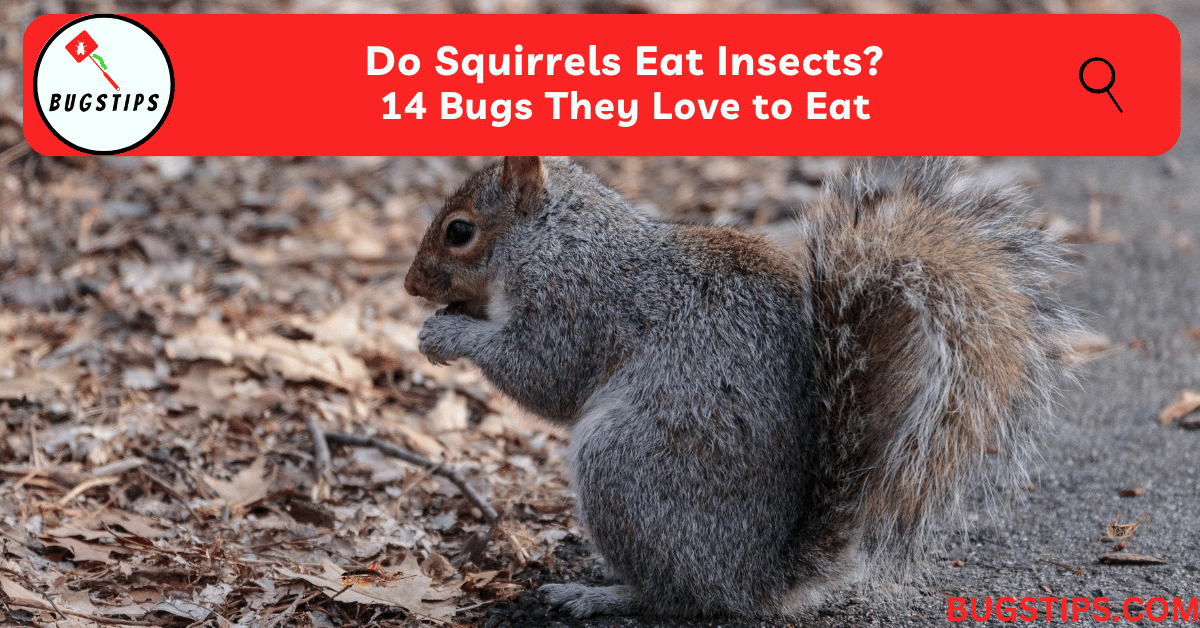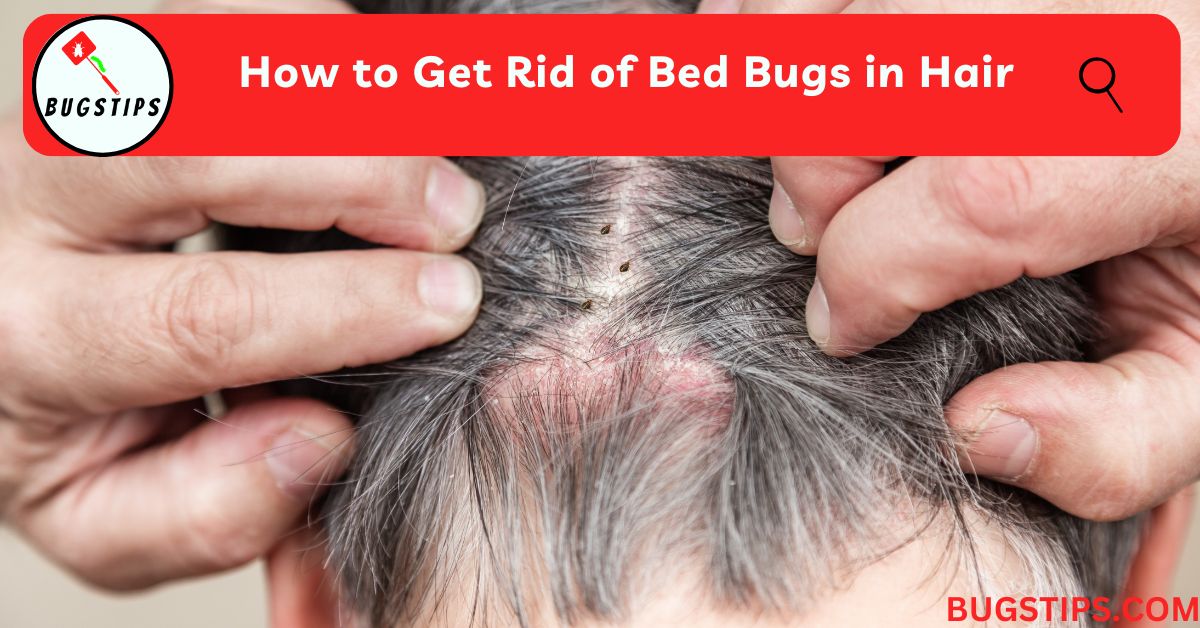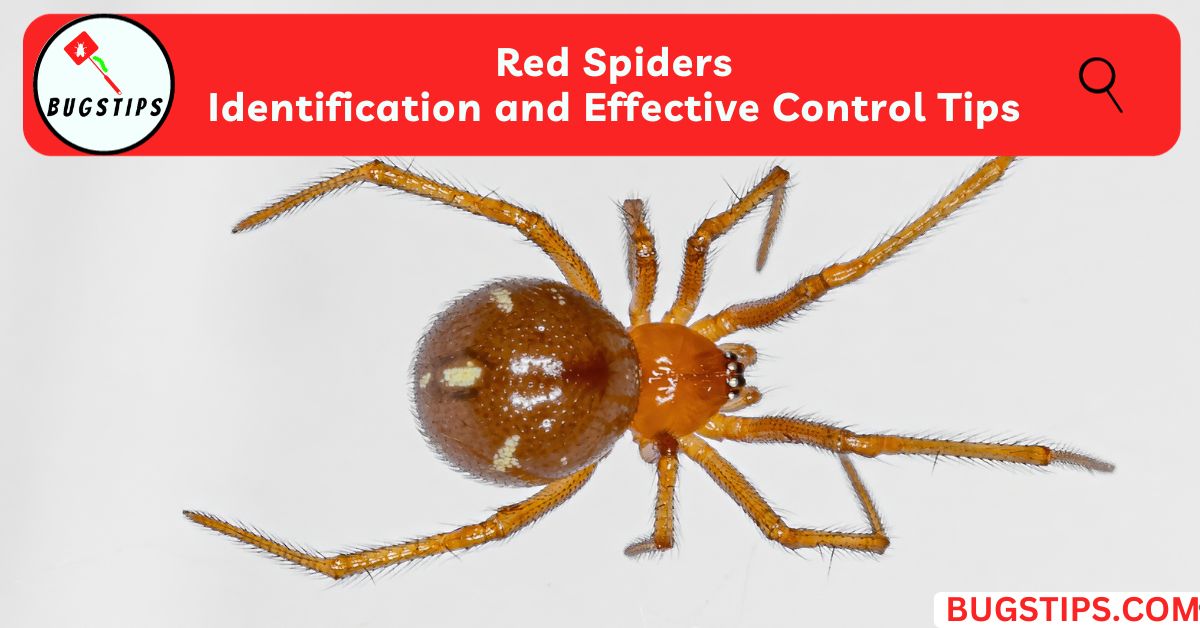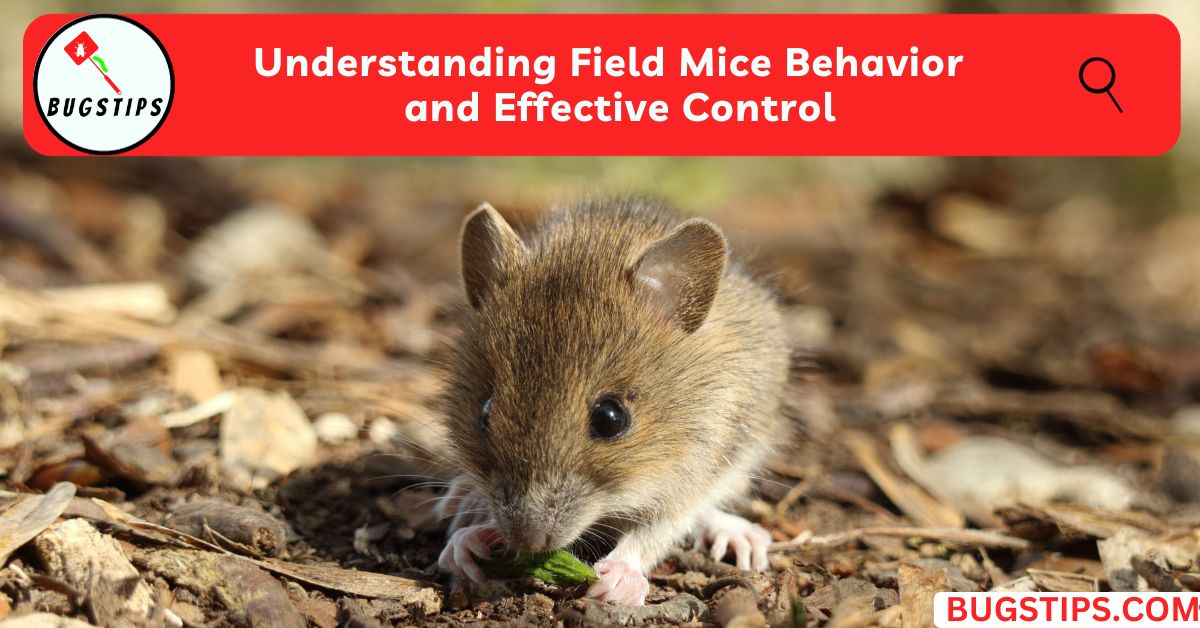This post may contain affiliate links which means as an Amazon Associate, this site may earn a small commission on qualified purchases made through links at no extra cost to you. Learn more on Affiliate Disclosure
Squirrels are perhaps best known for gathering and burying nuts to eat later. You may also see them nibbling on acorns, pinecones, flower buds, fruits, and seeds.
However, nuts and seeds aren’t the only things on a squirrel’s menu. Squirrels are actually opportunistic omnivores that will eat just about anything they can find – including insects.
While not all squirrel species around the world consume insects, many do enjoy eating a wide variety of bugs as part of their diverse diet.
But do squirrels eat insects? Let’s take a look at some of the most common insects squirrels are known to feast on as well as a few they tend to avoid.
Do Squirrels Eat Insects?
The short answer is yes, squirrels do eat insects. In fact, insects make up a small but significant part of most squirrels’ diets.
While nuts, seeds, fruits, fungi, and plants are a squirrel’s primary food sources, adding insects to the mix provides them with extra protein.
This is especially important for pregnant and nursing squirrel mothers who need more protein.
Squirrels are omnivorous, meaning they eat both plant and animal matter. Their taste for meat leads them to eat insects in addition to birds’ eggs, smaller rodents, and even young snakes.
This makes squirrels opportunistic feeders that take advantage of available food sources.
Related Article – Can Squirrels Eat Almonds?
What Insects Do Squirrels Eat?
As opportunistic feeders, squirrels will eat a variety of insects that are readily available in their habitats. The types of bugs they consume depend on factors like the region, season, and local ecosystem.
But there are some insects that appear to be preferred prey for many squirrel species.
Here are some of the most popular insect snacks for squirrels.
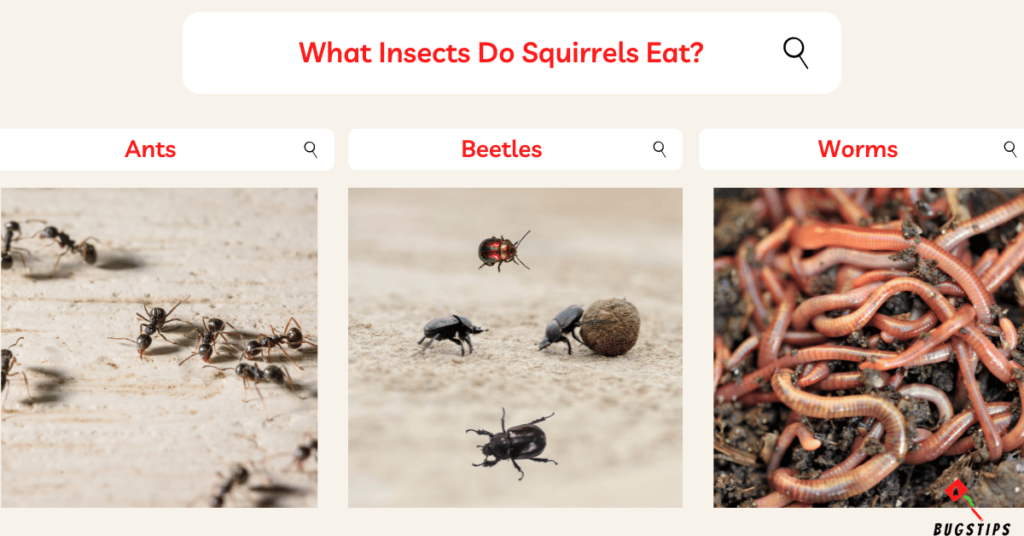
Ants
- Ants are tiny but mighty, providing squirrels with a good source of protein, carbohydrates, and healthy fats.
- Squirrels particularly seek out carpenter ants and field ants.
- They will dig up ant hills and devour the ants along with their eggs, larvae, and pupae.
- The formic acid ants release when under attack does not seem to deter squirrels.
- They lap up the ants with their versatile tongues and reap the nutritional rewards.
You May Also Like – Do Ants Poop?
Beetles
- Beetles are abundant in many of the forested areas and wooded habitats squirrels call home.
- They thrive in moist soil and woodlands, prime real estate for squirrels.
- Beetles provide essential amino acids, unsaturated fats, vitamins, and minerals.
- Squirrels dine on a variety of beetles including ground beetles, scarab beetles, potato beetles, weevils, and bark beetles.
- Their tough teeth and jaws allow them to crunch through the beetles’ hard exoskeletons with ease.
You May Also Like – 14 Small Tiny Brown Bugs In House
Worms
- Worms are pure protein packages for squirrels.
- They will nose through topsoil, mulch, and leaf litter seeking out earthworms and garden worms.
- The iron, protein, omega-3s, and other nutrients worms contain support cardiovascular and brain health.
- Squirrels even eat the worm castings for an extra dose of nutrients.
- Worms are especially key food sources in early spring when other prey may still be scarce.
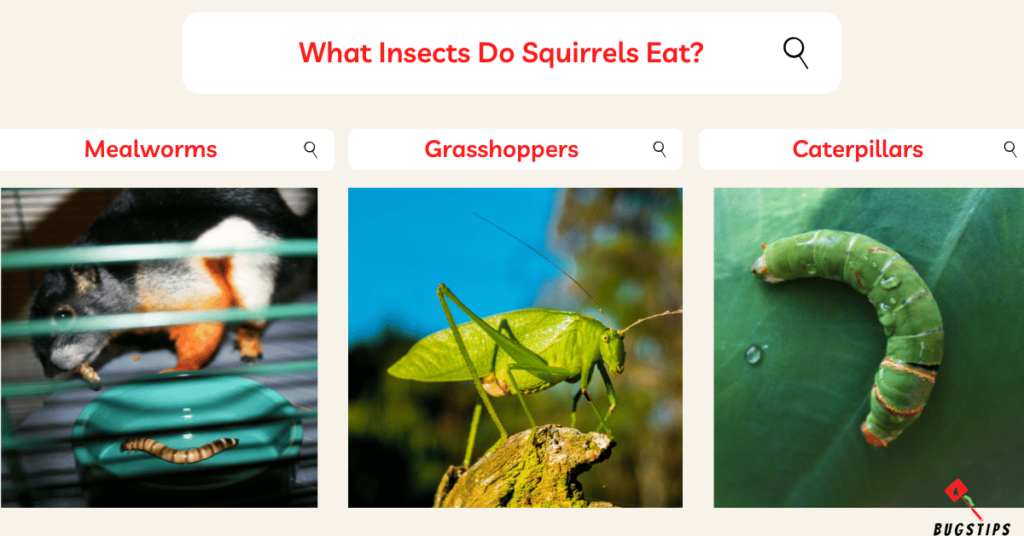
Mealworms
- The larval form of darkling beetles known as mealworms are another insect delicacy for squirrels.
- They are easier for squirrels to catch than adult beetles.
- Their soft bodies are packed with even more protein per ounce than beetles.
- Squirrels will munch on dried mealworms found in bird feeders as well.
You May Also Like – Where Do Squirrels Sleep
Grasshoppers
- Grasshoppers thrive in fields and forests, prime squirrel habitat.
- As insects that hop around on the ground, they make for easy targets for squirrels to pounce on.
- Grasshoppers are an excellent source of protein and nutrients to help promote growth and reproduction.
- Squirrels will consume various grasshopper species including locusts, crickets, and katydids.
- They are able to digest the spiny legs and hard exoskeletons thanks to their adaptable digestive system.
You May Also Like – What Do Hornworms Turn Into?
Caterpillars
- Caterpillars are the larval stage of butterflies and moths before they form a chrysalis and transform.
- Squirrels seek out these wiggly, worm-like insects to eat certain species.
- Caterpillars are packed with protein, healthy fats, vitamins, and minerals.
- Their soft bodies are easy for squirrels to digest as a snack.
- Some of the tastiest treats include tent caterpillars, gypsy moth caterpillars, and fall webworms.
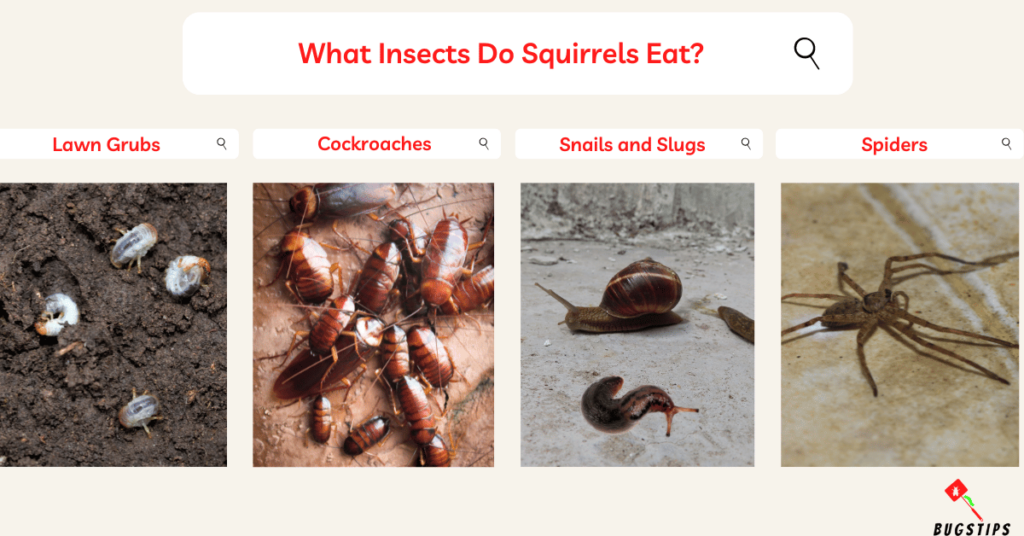
Lawn Grubs
- Lawn grubs are the larval form of insects like June bugs that live underground.
- Squirrels put their digging skills to work unearthing these juicy bug treats from soil and lawns.
- Lawn grubs are an excellent source of fat and protein to help squirrels maintain energy and body heat.
- They also feast on Japanese beetle grubs, which damage plant roots, helping get rid of garden pests.
Cockroaches
- Cockroaches tend to thrive around human homes and buildings but also live in wooded areas.
- Squirrels will eat cockroaches for their high protein content despite potential bacteria concerns.
- Their powerful digestive systems allow them to consume all types from German to American roaches.
- Squirrels help control pest populations as just one cockroach can produce over 30,000 offspring.
You May Also Like – Do Cockroaches Sleep?
Snails and Slugs
- Snails and slugs thrive in dark, moist environments squirrels often frequent like woodlands and forests.
- Squirrels use their nimble paws and fingers to pull the slimy creatures from rocks, logs, and leaves.
- Their strong jaws crush through the shells and bodies with ease.
- Snails help provide nutrients needed for reproduction while slug slime contains compounds that support immunity.
Spiders
- Spiders may seem like a strange snack, but squirrels will readily eat them for their rich protein and fat content.
- Smaller varieties like jumping spiders, wolf spiders, and fishing spiders are perfect bite-sized protein nuggets.
- Larger squirrels can take down bigger orb weavers and tarantulas.
- The squirrel’s flexible digestive system allows it to consume the entire spider along with any venom it produces with no ill effects.
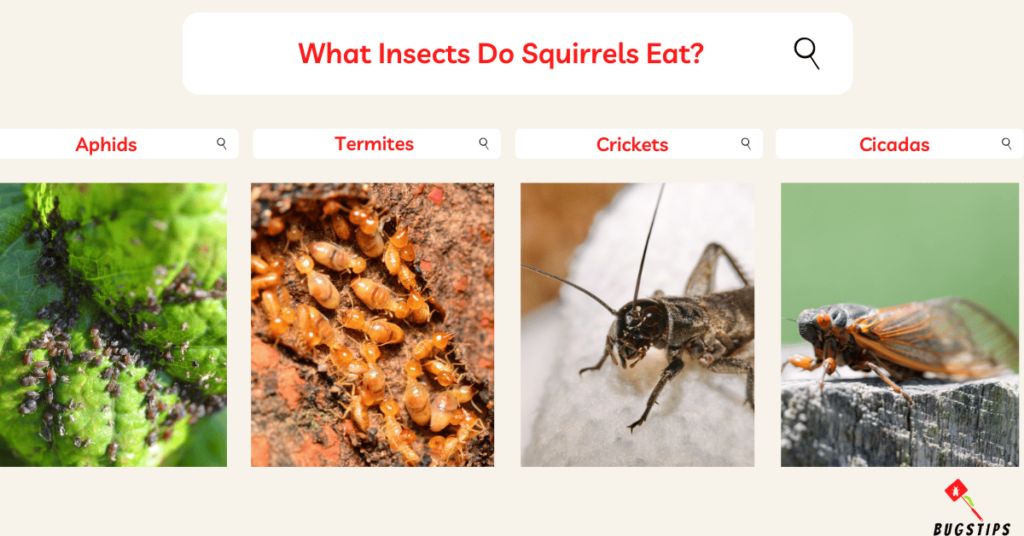
Aphids
- Tiny sap-sucking aphids can destroy plants and crops while providing nourishment for squirrels.
- They use their nimble claws and fingers to pick off aphids from leaves and branches.
- Aphids contain amino acids squirrels need for growth and reproduction.
- And since aphid populations can explode quickly, squirrels put a dent in destroying garden greenery.
Related Article – White Bugs on Plants
Termites
- Squirrels will snack on both flying and crawling termite varieties.
- Termites destroy wood buildings and trees, so squirrels provide natural pest control.
- Termites offer carbohydrates for energy as well as protein, healthy fats, potassium, and other nutrients squirrels require.
Crickets
- Crickets are an abundant food source for opportunistic squirrels, especially in the warmer months.
- They chow down on field crickets, camel crickets, mole crickets, and more.
- Crickets contain more protein per gram than steak. Their muscles provide amino acids while their big back legs pack a fatty acid punch.
- Catching and eating crickets helps squirrels quickly put on weight.
Cicadas
- Cicadas offer a feast for squirrels whenever these insects emerge en masse.
- Squirrels will gorge on the protein and fat-rich adult cicadas.
- They also dig underground to eat the cicada nymphs before they have fully developed.
- The crunchy exoskeletons contain chitin which supports bone health. All in all, cicadas make for a beneficial banquet.
You May Also Like – Will a Mouse Trap Kill a Chipmunk?
Are There Any Insects That Squirrels Avoid Eating?
While squirrels eat a wide variety of insects, there are some bugs and creepy crawlies they try to steer clear of. Here are some of the main insects squirrels avoid and why.
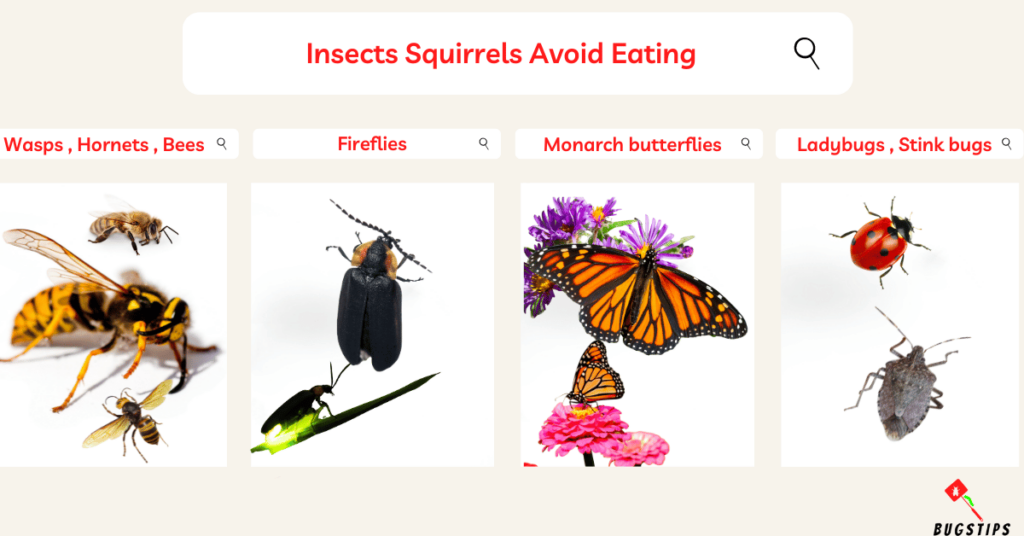
Stinging Insects
- Squirrels typically stay away from insects that can inflict painful stings like wasps, hornets, and bees.
- They will avoid nests and hives and are reluctant to eat these stinging insects.
- However, squirrels may eat honey bees that die naturally.
Toxic Insects
Certain insects contain toxins or compounds that can sicken squirrels if ingested. For example, some species of caterpillars have stinging spines or poisons that squirrels detect and avoid.
Here are other toxic insects that squirrels avoid eating.
- Fireflies – Their light-emitting lucibufagins are poisonous.
- Monarch butterflies – Their caterpillars feed on poisonous milkweed making monarchs toxic.
- Ladybugs – They release a foul hemolymph liquid when threatened.
- Stink bugs – Foul-smelling glands all over their bodies deter squirrels.
| Insects Squirrels Love to Eat | Insects Squirrels Avoid |
| Ants | Stinging insects like wasps |
| Beetles | Toxic caterpillars |
| Worms | Fireflies |
| Crickets | Monarch butterflies |
| Snails | Stink bugs |
Related Article – 16 Green Bugs That Bite
Final Thoughts
When people think of a squirrel’s diet, nuts and seeds usually come to mind first.
However, squirrels are opportunistic omnivores and make the most of the food sources available to them. This includes eating a variety of insects.
Ants, beetles, worms, crickets, and many other bugs provide protein, nutrients, and fats to help squirrels grow, thrive, and reproduce.
Squirrels will consume almost any insect they can get their paws on.
However, they do tend to avoid insects that sting or contain toxins that could make them sick.
Squirrels help control insect populations while reaping nutritional rewards.
Watching squirrels in your own backyard, you may catch them snacking on an insect buffet as part of their diverse diet.
You May Also Like – Can Squirrels Die From Falling?
FAQs
How do squirrels hunt for insects?
Squirrels use their sharp eyesight, keen sense of smell, and digging skills to uncover insects to eat under bark, rocks, soil, and grass. They pounce quickly to catch bugs.
Do squirrels eat grubs?
Yes, squirrels dig up and consume high-protein grubs like larvae from beetles, moths, and other insects.
Do squirrels eat ants?
Yes, squirrels love protein-packed ants. They raid ant hills and nests to feast on eggs, larvae, pupae, and adult ants.
Do squirrels eat snails?
Yes, squirrels use their nimble paws and strong jaws to extract snails from shells for a calcium-rich snack.
Do squirrels eat crickets?
Crickets are abundant in squirrel habitats, making them a readily available food source. Squirrels will catch and eat crickets for their protein.
Do squirrels eat grasshoppers?
Grasshoppers are an easy insect for squirrels to pounce on and consume.
Will squirrels eat worms?
Earthworms and garden worms are full of protein, healthy fats, iron, and nutrients. Squirrels love snacking on these wiggly crawlies.
Do Japanese dwarf flying squirrels eat insects?
Yes, insects are part of Japanese dwarf flying squirrels’ varied omnivorous diet in addition to plants, fungi, and fruits.
Resources – (for further reading)
Maine.gov – Squirrels: Got Pests?
JSTOR – Foraging Patterns of Eastern Gray Squirrels
ScienceDirect – Photinus – an overview

